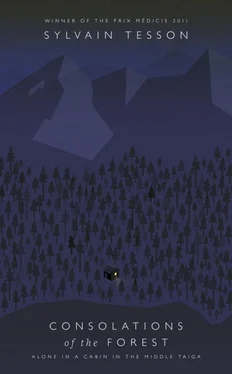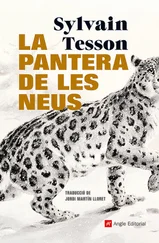I scribble all day, writing anything at all so as not to feel pain. In my little black notebooks the people are full of memories, anecdotes, thoughts. I read The Stoics : there are things in their practices you can use to steel yourself, a first step towards consolation. I’d like to snuff out my pain in this forest that knows nothing of sorrow. Life everywhere: ducks, seals and a bear, in my binoculars, at the base of the hill where I like to rest. It’s the evening hour when everyone goes home and says a last thank-you to this latest day of life.
My body is compressed with suffering. Can the great pressures of grief provoke congestive heart failure?
The only hope on the horizon is the expected arrival tomorrow of Bertrand de Miollis and Olivier Desvaux, two painter friends who are travelling in Russia and have promised to visit me. Sergei is supposed to bring them here by boat. As it turns out, they’re arriving right when I’m as flat as a tar blotch on a beach.
I’ll say nothing to them, hide my tears, and use their presence to stay alive.
18 JUNE
Hang on. And to hang on, take strength from the infinite solidity of the little dogs. Nature is overjoyed at getting its hands on a new summer. At six in the evening, the sound of an engine rouses me from my stupor. A black dot to the south: my deliverance. I welcome Miollis and Desvaux like a benediction; they will distract me from my danse macabre . Sergei heads back without even tossing back a single glass, because the wind is rising. I sit the two painters down at the wooden table beside the lake and unpack all the provisions they’ve brought from Irkutsk: wine, beer, vodka, hard cheese. We get falling-down drunk. The alcohol takes its toll on our bodies, but at least it chases away all sorrow.
19 JUNE
The happiness lasts one second. There’s a pleasant moment upon awakening at dawn, just before consciousness remembers and the heartache begins again.
Since the apocalypse of 16 June, I’ve read two Shakespearean comedies, The Handbook of Epictetus, the Meditations of Marcus Aurelius, José Giovanni’s The Adventurers and Eve , a psychological thriller by James Hadley Chase, the hero of which is a lousy creep whose character sucks the life out of everything and creates a desert around him. That guy is me. Guided by a mysterious impulse, my hand selected the books I needed to read. Marcus Aurelius helped me. Giovanni showed me the man I should have been; Chase showed me as I am. Books are more useful than psychoanalysis; they say everything, better than life does. In a cabin, mixed with solitude, they make a perfect lytic cocktail, gradually relieving the symptoms of acute disease.
The vodka hangover hangs us out to dry. Miollis and Desvaux emerge at noon, having slept on the cabin floor. To sweat out the poison, we set off on foot for the Lednaya and have lunch on one of the grassy shelves on the cliffs of the right bank. The dogs run around chasing ducks. All that joy!
Two easels planted on a beach before white-smocked painters, who compose their pictures with careful little brushstrokes. A couple of dogs lie at their feet in the pale mauve twilight of Siberia. It’s a classically peaceful scene, and I can’t take my eyes off my friends, who have been travelling through Siberia painting from nature in the purest tradition of the itinerant painters of Holy Russia. With the help of light and a dollop of time, they create space in two dimensions. I’m writing these lines while they put the finishing touches on their canvases. The cabin is beginning to look like an artist’s studio: a Villa Medici for muzhiks.
20 JUNE
At dawn, I pose, sitting at my work table. The two painters have set up their easels in the cabin. Miollis looks like a German troubadour and Desvaux, a Swiss shepherd. Desvaux is technically conservative, painstaking and generous, and he always pulls something off. Miollis is more hit-and-miss, sometimes blowing his picture but occasionally coming up with a stunner. This morning they are painting a man with a crumpled heart. It’s easy to hide feelings. Constructed in haste by Russian government ministers out in the countryside (or so the story goes), ‘Potemkin villages’ were just façades restored and repainted on the fly to hide hovels and impress the ruler of Russia on a tour of inspection, who then went happily home to the palace.
Cheerful Miollis and gentle Desvaux distract me from my misery. Without them, grief would eat me up like a crab.
In one day my guests paint the cabin, the dogs, the beach. It takes as much nerve to try rendering the beauty of this place on canvas as it does to capture it in a few perfectly chosen words.
21 JUNE
This morning, a big ship passes well out on the lake. Ten minutes later the wake reaches the beach, carrying with it something of the world’s unpleasant intrusion onto my pristine little property.
The painters spend the day limning the flight of wild geese through the radiant heavens. They stand before their easels as if before a window that is waiting for them to invent its view.
I climb to the top of the crumbling butte to have lunch. Having reached the summit, my dogs gaze pensively at the lake, panting and drooling. Five days ago, these little creatures held out their paws and saved me from drowning.
At twilight, fishing. Desvaux catches dinner for three people and two dogs. His silhouette stands out against the great ash tree that leans over the water at the point of the cape. Unwilling to come down from the heights, the light clings to the spurs of the cliffs. A flash of silver at the end of the line: the lake is giving up its treasures. Writing, painting, fishing: three ways of paying one’s respects to time.
22 JUNE
Pollen has fallen on the lake and hems the beaches with bright yellow ribbons. Dead butterflies drift on the waters. Seals keep surfacing to stare at the shore, checking to see that the world is still in its place and that they’ve done well to dwell in the depths.
Not a sound, not one noise, just the odd butterfly.
‘Silence, the ornament of sacred solitudes’ ( Life of Rancé ).
Miollis and Desvaux go from painting to painting, offerings in harmony with the genius loci . The infinite superiority of a painting over a photograph. A snapshot immobilizes a precise moment in time and stakes it out in two dimensions. (Primitive peoples were not entirely wrong to see photos as thefts.) A painting offers a historical interpretation of a moment that will live a long time in the eye of those who contemplate it, and, as a work that does not interrupt the flow of time, its very confection is fluid, inscribed in a long period of composition.
23 JUNE
Shortly before dawn, we head out for a six-hour trek along the shore.
Miollis and Desvaux are returning to Irkutsk and must take a boat setting out this morning from Zavorotni, a fifteen-mile hike from the cabin. We look like three Jewish painters fleeing along the Vistula with all our art impedimenta crammed into beggars’ bags. We’re bent double under enormous backpacks stuffed with fifty-odd pounds of gouache paints and mediums in tubes, an encyclopaedia of Russian painting, and the easels on top. At Middle Cedar Cape, we salute the hermit’s ghost. Near the pond by the derelict cabin we find the carcass of a bear. Leaning against an immense ash tree at South Cedar Cape, an anthill teems with life: millions of skeletons busily build themselves a body. Barnacle geese speed north fast enough to dislocate their necks. I waste some time trying to find the old geologists’ path V.E. told me about that runs along some 500 feet above the lake, but the trail has been invaded by saplings that make walking even more difficult than on the stones of the lakeshore.
Читать дальше












